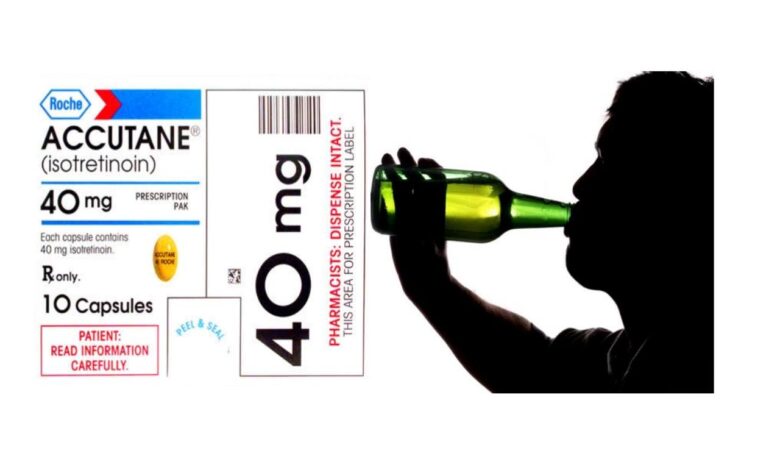Can I Drink Alcohol While On Accutane?

Mixing medication and alcohol comes with serious risks – and it’s extremely important to understand the dangers. Findings from studies suggest a significant percentage of people do know about the risks of mixing medication with alcohol, but their perceptions of danger somewhat differ from what doctors and pharmacists say.
Results from research also indicate that alcohol is a significant part of many people’s social lives, and the perceived dangers of drinking with medication are perhaps not enough to stop this behavior. Understanding how best to address American health and safety, especially in a nation where over half the population consumes prescription drugs is important. We can help ourselves, our friends, and our community by understanding the dangers and taking steps to prevent harm.
What is Accutane?
Accutane is a brand of isotretinoin, a powerful drug used in the treatment of acne. Four to five months of Accutane treatment usually leads to clearing of acne. It is a potent medication that is very effective for nearly all types of breakouts. Accutane is needed for moderate to severe acne that has failed other treatments. It should be used for severe, scarring acne.
Accutane is also used for acne present for many years that has not responded completely to antibiotic pills and creams. While it has many side effects, in some ways it is safer than long-term antibiotic usage. Most other acne-controlling medicines are antibacterial agents, which are effective only if used daily. Over two million people have taken this drug, so a lot is known about its safety and effectiveness.
Accutane is a naturally occurring derivative of vitamin A and is detectable in the bloodstream of all people. Vitamin A in large doses has the same effects as Accutane, both good and bad, but quickly becomes harmful since it builds up in the tissue. (Important: Don’t take any vitamin A while on Accutane). Accutane is formed naturally in the body from the Vitamin A present in the bloodstream. This is why large amounts of Vitamin A taken during pregnancy cause the same birth defects that Accutane does.
Can you drink on Accutane?
No, you should avoid alcohol while taking Accutane, because it can result in unpleasant side effects such as increased heartbeats, warmth or redness under your skin, tingly feeling, nausea, and vomiting.
If you must drink, keep the amount to the barest minimum. This is because there’s a risk of damage to your liver – and that your cholesterol levels can increase.
What are the other side effects of Accutane?
If a person takes Accutane while pregnant, this medication can cause:
- Severe birth defects
- Miscarriage
- Stillbirth
Prevent this side effect: To get a prescription for isotretinoin, a patient who can become pregnant must take two pregnancy tests to make sure they’re not pregnant. Patients must also agree that while taking this medication, they will have a monthly pregnancy test and use two forms of birth control.
It’s common to experience one or more of the following while taking isotretinoin:
- Dry skin, severely chapped lips
- Nosebleeds
- Dry, irritated eyes
- Dry mouth
Treat these side effects: These will clear once you stop taking the medication. Until then, you can get relief with moisturizer, lip balm, and artificial tears. For nosebleeds, apply petroleum jelly just inside your nose. This helps keep the tissue moist, which can prevent nosebleeds.
When you take Accutane, you may become:
- Extremely sensitive to the sun
Manage this side effect: Your dermatologist will tell you how to protect your skin from the sun while taking isotretinoin. Once you stop taking isotretinoin, this sensitivity will go away.
Because isotretinoin effectively treats so many people with severe acne, many people are surprised by this possible side effect:
- Acne worsens
Know that this side effect is temporary: When you start taking isotretinoin, acne can worsen for 1-2 months before it begins to clear. This happens with many other acne treatments.
While taking isotretinoin, you may develop:
- Trouble seeing at night (night blindness)
- Thinning hair
- Muscle (or joint) pain
Understand that these side effects are temporary: These side effects tend to go away when you stop taking isotretinoin. Lost hair tends to grow back.
Other possible side effects: When taking isotretinoin, other concerning side effects may occur. These include:
- Rash
- Stomach problems
- Unhealthy cholesterol levels
Uncommon side effects include:
- Increasing pressure on the brain, which can lead to problems with your eyesight, permanent loss of eyesight, and, in rare cases, death.
- Liver damage.
Youn can find useful information on Can You Drink Alcohol With Contrave?





